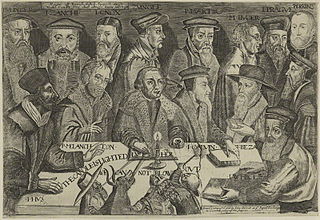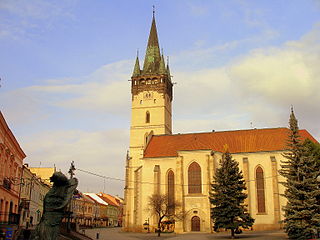The Reformation, also known as the Protestant Reformation and the European Reformation, was a major theological movement in Western Christianity in 16th-century Europe that posed a religious and political challenge to the papacy and the authority of the Catholic Church. Towards the end of the Renaissance, the Reformation marked the beginning of Protestantism and in turn resulted in a major schism within Western Christianity.

Western Christianity is one of two subdivisions of Christianity. Western Christianity is composed of the Latin Church and Western Protestantism, together with their offshoots such as the Old Catholic Church, Independent Catholicism and Restorationism.

Early modern Europe, also referred to as the post-medieval period, is the period of European history between the end of the Middle Ages and the beginning of the Industrial Revolution, roughly the mid 15th century to the late 18th century. Historians variously mark the beginning of the early modern period with the invention of moveable type printing in the 1450s, the Fall of Constantinople and end of the Hundred Years' War in 1453, the end of the Wars of the Roses in 1485, the beginning of the High Renaissance in Italy in the 1490s, the end of the Reconquista and subsequent voyages of Christopher Columbus to the Americas in 1492, or the start of the Protestant Reformation in 1517. The precise dates of its end point also vary and are usually linked with either the start of the French Revolution in 1789 or with the more vaguely defined beginning of the Industrial Revolution in late 18th century England.
A Christian denomination is a distinct religious body within Christianity that comprises all church congregations of the same kind, identifiable by traits such as a name, particular history, organization, leadership, theological doctrine, worship style and, sometimes, a founder. It is a secular and neutral term, generally used to denote any established Christian church. Unlike a cult or sect, a denomination is usually seen as part of the Christian religious mainstream. Most Christian denominations refer to themselves as churches, whereas some newer ones tend to interchangeably use the terms churches, assemblies, fellowships, etc. Divisions between one group and another are defined by authority and doctrine; issues such as the nature of Jesus, the authority of apostolic succession, biblical hermeneutics, theology, ecclesiology, eschatology, and papal primacy may separate one denomination from another. Groups of denominations—often sharing broadly similar beliefs, practices, and historical ties—are sometimes known as "branches of Christianity". These branches differ in many ways, especially through differences in practices and belief.
The Radical Reformation represented a response to perceived corruption both in the Catholic Church and in the expanding Magisterial Protestant movement led by Martin Luther and many others. Beginning in Germany and Switzerland in the 16th century, the Radical Reformation gave birth to many radical Protestant groups throughout Europe. The term covers Radical Reformers like Thomas Müntzer and Andreas Karlstadt, the Zwickau prophets, and Anabaptist groups like the Hutterites and the Mennonites.
Protestantism originated from the Protestant Reformation of the 16th century. The term Protestant comes from the Protestation at Speyer in 1529, where the nobility protested against enforcement of the Edict of Worms which subjected advocates of Lutheranism to forfeit all of their property. However, the theological underpinnings go back much further, as Protestant theologians of the time cited both Church Fathers and the Apostles to justify their choices and formulations. The earliest origin of Protestantism is controversial; with some Protestants today claiming origin back to people in the early church deemed heretical such as Jovinian and Vigilantius.

High church Lutheranism is a movement that began in 20th-century Europe and emphasizes worship practices and doctrines that are similar to those found within Roman Catholicism, Eastern Orthodoxy and Anglo-Catholicism. In the more general usage of the term, it describes the general high church characteristics of Lutheranism in Nordic and Baltic countries such as Sweden, Finland, Estonia and Latvia. The mentioned countries, once a part of the Swedish Empire, have more markedly preserved Catholic traditions.
Lutheranism as a religious movement originated in the early 16th century Holy Roman Empire as an attempt to reform the Catholic Church. The movement originated with the call for a public debate regarding several issues within the Catholic Church by Martin Luther, then a professor of Bible at the young University of Wittenberg. Lutheranism soon became a wider religious and political movement within the Holy Roman Empire owing to support from key electors and the widespread adoption of the printing press. This movement soon spread throughout northern Europe and became the driving force behind the wider Protestant Reformation. Today, Lutheranism has spread from Europe to all six populated continents.

Religion in Switzerland is predominantly Christianity. According to the national survey of the Swiss Federal Statistical Office, in 2020, Christians accounted for 61.2% of the resident population, of whom 33.8% were Catholics, 21.8% were Swiss Protestants, and 5.6% were followers of other Christian denominations. The proportion of Christians has declined significantly since 1980, when they constituted about 94% of the population; during the same timespan, unaffiliated Swiss residents have grown from about 4% to 31% of the population, and people professing non-Christian religions have grown from about 1% to 7% of the population. In 2020, according to church registers, 35.2% of the resident population were registered members of the country's Catholic Church, while 23.3% were registered members of the Protestant Church of Switzerland.

The Protestant Reformation during the 16th century in Europe almost entirely rejected the existing tradition of Catholic art, and very often destroyed as much of it as it could reach. A new artistic tradition developed, producing far smaller quantities of art that followed Protestant agendas and diverged drastically from the southern European tradition and the humanist art produced during the High Renaissance. The Lutheran churches, as they developed, accepted a limited role for larger works of art in churches, and also encouraged prints and book illustrations. Calvinists remained steadfastly opposed to art in churches, and suspicious of small printed images of religious subjects, though generally fully accepting secular images in their homes.

Reformed Christianity originated with the Reformation in Switzerland when Huldrych Zwingli began preaching what would become the first form of the Reformed doctrine in Zürich in 1519.

Second scholasticism, also called Modern scholasticism, is the period of revival of scholastic system of philosophy and theology, in the 16th and 17th centuries. The scientific culture of second scholasticism surpassed its medieval source (Scholasticism) in the number of its proponents, the breadth of its scope, the analytical complexity, sense of historical and literary criticism, and the volume of editorial production, most of which remains hitherto little explored.

In 16th-century Christianity, Protestantism came to the forefront and marked a significant change in the Christian world.

The following outline is provided as an overview of and topical guide to Christianity:
The Augsburg Confession, also known as the Augustan Confession or the Augustana from its Latin name, Confessio Augustana, is the primary confession of faith of the Lutheran Church and one of the most important documents of the Protestant Reformation. The Augsburg Confession was written in both German and Latin and was presented by a number of German rulers and free-cities at the Diet of Augsburg on 25 June 1530.

Protestantism is a branch of Christianity that emphasizes justification of sinners through faith alone, the teaching that salvation comes by unmerited divine grace, the priesthood of all believers, and the Bible as the sole infallible source of authority for Christian faith and practice. The five solae summarize the basic theological beliefs of mainstream Protestantism.
The religion of Protestantism, a form of Christianity, was founded within Germany in the 16th-century Reformation. It was formed as a new direction from some Roman Catholic principles. It was led initially by Martin Luther and later by John Calvin.
The following outline is provided as an overview of and topical guide to Protestantism:
Catholic–Protestant relations refers to the social, political and theological relations and dialogue between Catholic Christians and Protestant Christians.









